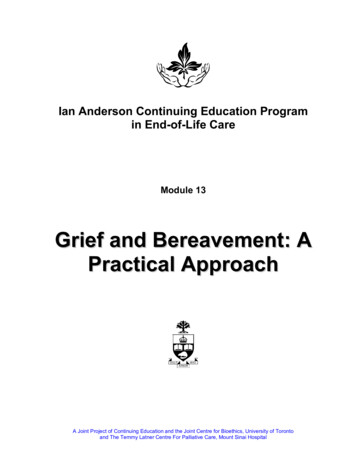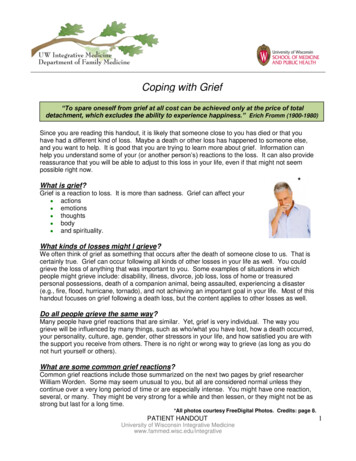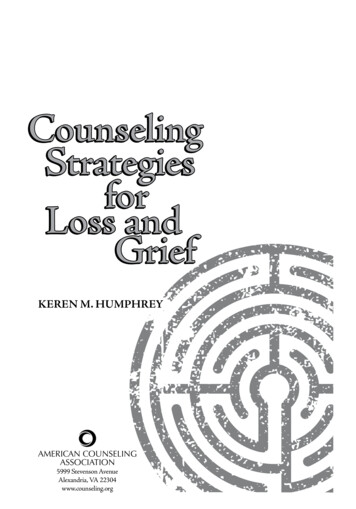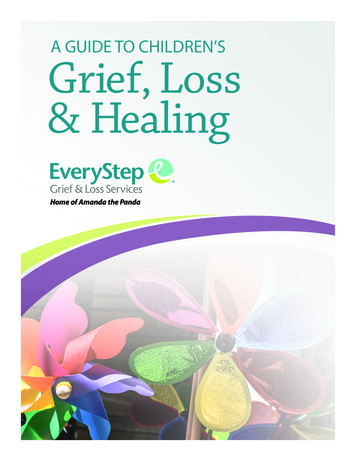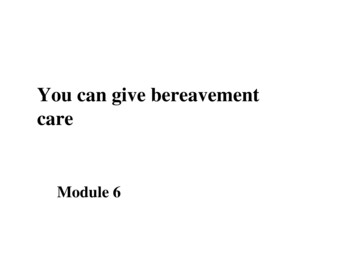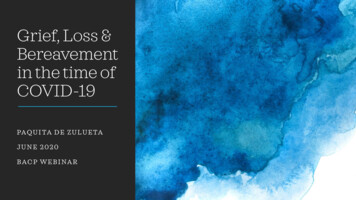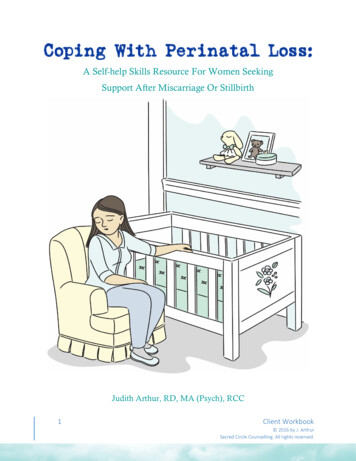
Transcription
Grief Handbook for Teens-1-
Working Through the GriefThis booklet is designed specifically for teens. Its purpose is to help you understand andwork through your grief. Healing from grief is not easy, and you don’t have to do it alone.For over 30 years, Hospice of Santa Cruz County has supported people of all ages in recognizing,understanding and healing their grief.The information in this booklet has been compiled from many different sources which wehave found to be helpful over the years. We especially acknowledge the Centre for Livingwith Dying in Santa Clara, California; the Teen Talk Grief Support Group at Good SamaritanHospice in Puyallup, Washington; and Linda Cunningham at TAG Teen Age Grief, Inc.whose work with grieving teens has helped to shape this booklet.-2-
What is Grief?Grief is a normal and natural response toloss. And, loss is something that you feelwhen there is a separation from something orsomeone that you care about. There are manykinds of grief and loss that we face everyday.You may experience grief when a pet dies, whena friend moves away, or if your parents divorce.You may feel a loss when you have to changeschools, or when you and your boyfriend or girlfriendbreak up. And there is grief when someone you love dies.Losing someone you love or care about is painful. Dealingwith the feelings after someone dies can seem overwhelming. Sometimes it helps to understand the many feelings thatyou may experience as you are grieving.Grief can be confusing, overwhelming and lonely. It can feellike your life is out of control. But grief is not a problem.It is not something to “get over.” It is the normal, healthyprocess of healing.How you experience grief and your own grief process is aunique journey. Some feelings will be similar to thoseof people around you, while other feelings will bedifferent. How you grieve and the feelings that youexperience may depend on the kind of relationshipthat you had with the person who died and howthey died. Was it a loving relationship? Was it fullof conflict? Was it sudden? Or violent? Or was therea prolonged illness? Was the person who died yourparent, grandparent, teacher, sibling, cousin orfriend? All of these will impact how you grieve.-3-
Lack of -AnxietyGrief uiltFearYearningFeelings in Grief
Feelings in GriefHere are some of the feelings that you may experience when grieving. Feeling them ispart of the healing journey.ShockThe person you care about has just died. You can’t believe that it is true. You feelnumb. Total disbelief. You feel that a cruel joke has been played on you. This cannot bereal! You may find yourself truly believing that they are still alive, when you also knowfor a fact that they have died. You want to scream, “NO, it’s not true!” You may notfeel anything for a while, and that’s OK too. This feeling of shock and numbness canlast for hours, days, weeks and sometimes longer.SadnessriefBusAs the shock begins to wear off, you gradually begin to believe the person is reallygone. You may feel sad. You may cry many tears, or you may feel intense sadness andnot be able to cry. You are very aware of how much you are going to miss the personyou cared so much about. Nothing really makes you happy right now. You don’t seemto care about anything. The empty feeling in your heart just doesn’t seem to go away.You may need to talk about your loss with someone you can trust.LonelinessAlong with sadness comes loneliness. Other people not affected by your loss seemhappy, carefree and going about life in a normal way. This is not the way that youfeel. Your life doesn’t feel normal. You may not want to be out with your friends, orif you do go out, you may feel guilty if you have fun. You may feel as if no one understands. After the funeral, people often stop talking about the person who died. Itis during this time that it is normal and common to feel alone with your sadness.ReliefMany people feel relieved when someone dies. Maybe the person had been sick for avery long time, and you are glad that their suffering is finally over. Maybe the personwas abusive, and you feel relieved that you will never have to experience abuse fromthat person again. Relief is a natural reaction.-5-
Anxiety and FearYou may begin to feel anxious. Death has now become a reality in your life. It is nolonger just a news story or something that only happens to other people. It has happened to you. This may bring up fear about when death will touch your life again.You may worry that something will happen to you, your friends, or your family. Youmay be anxious about how you’ll make it without this person. Sometimes, you mayeven experience physical symptoms such as shortness of breath, pains in your chest,headaches and/or an upset stomach. Most people do experience these kinds of bodyreactions during the first few weeks following a death.Anxiety and fear are normal reactions to the stress of your loss.GuiltEveryone seems to have regrets when someone dies. You may be thinking of all thethings you wish you would have said or done. Perhaps you are remembering thingsthat you wish you hadn’t said or done. You thought that you had a lifetime to say, “Ilove you”, or “thank you”, or “I’m sorry.” Now, you may feel guilty wishing you hadsaid or done more for the person who died. You may begin to ask yourself questionslike, “Why did I say that to him?” or “Why wasn’t I nicer to her?”If you feel guilty, talk to someone that you trust or try writing in your journalabout how you feel. Don’t keep guilt locked up inside of you. Remember thatyou are human. Forgive yourself.-6-
AngerAnger is another feeling that is a normal part of the grief process. You might bethinking, “This is not fair.” “Why did he have to die?” “Didn’t she know that I needed her?” “I hate it when my friends yell at their mom. They have no idea how quicklyall of life can change.” You may find yourself resenting others who still have theirparent, sister, brother, friend or other loved one. Some people find themselves angryat God and asking, “Why me?” You may even feel angry at the person who died. Youmay feel abandoned and alone. Anger may be masking the hurt, pain and confusionthat you feel. Many people don’t understand that anger is a part of grieving, and sothey may not understand why you are angry.It is OK to feel angry, and the important thing is to express it in a healthyway. Talk with someone. Go for a walk or a run. Lift weights. Draw. Write.Listen to music. Scream into a pillow. Scream in your car. Do whateverworks for you to release the anger in a safe way.DepressionYou may feel sad, tired, lonely, lost, and/or empty inside. This is a time when you maynot feel like going out with your friends. You may feel that no one understands or caresabout how you are feeling or what you are thinking. You may feel incredibly miserableand alone. Being depressed is not a pleasant feeling, but it may allow you the opportunityto be alone with your sadness, to think about what has happened, to sort it all out, tobegin to understand that your loss is permanent and that you have been changed.Talking can often help. Try to tell at least one person how you feel.The feelings of grief that you have just read about begin the momentyou know someone has died. You may experience all of them or someof them. You may experience more than one feeling at the same time.This can be confusing. Feelings do not always make sense, but theyare real. They are a part of who you are.-7-
Common Grief ReactionsPhysical Reactions are NaturalLack of energyFatigueHollowness in stomachTightness in chestShortness of breathDry mouthIncreased noise sensitivityPainProblems sleepingChanges in appetiteRestlessnessTensionExhaustionriefBusGrief can affect the way you act and thinkTrouble concentratingForgetfulnessStrange dreamsSpacing outWithdrawingBeing reckless-8-
Grief affectsyour body,mind and spirit.You may find yourself.Carrying special objects to remind you of yourloved oneVisiting the grave siteKeeping an altarKeeping belongings intactLooking at photosTalking to the person who diedChanging your daily routineSpiritual questions may come upHow is she?Where is he now?Why could God allow this?When will I die?Will I see her again when I die?What will happen to me when I die?-9-
You’re Not AloneSometimes it can feel like you’re the only one who has lost someone. But many peopleyour age have experienced the death of someone they love. Here’s how other teenagershave described their feelings.“No one at schoolunderstands anything.”“I don’t think I will ever be able to walk into another hospital.”“I feel as if dad is still here. I can’t believe he’s really gone.”“I feel very strange. Sometimes I feel like a totally differentperson since my Dad died and other times, I feel like nothing hashappened.”- 10 -
“I always feel like cryingbut I hold it back and thenI just shut down.”“People call the house and ask me how my mom’s doing, nothow I’M doing.”“I hate it when people say, I’m sorry.”“Will I ever feel better?”“I just don’t belong anymore - anywhere - home or at school.”“I’m jealous of friends who have a relationship with their parent.”- 11 -
HealingHealing takes time and energy. There is no time line. Everyone is different. For somepeople it may be days or weeks, while for others it takes months or years. But slowly allthe feelings that you have been experiencing begin to feel less heavy. First hours, thendays will go by where you may not think about the person who has died. There will stillbe things that remind you of the person – a song, a favorite place you used to go together,a particular food, a time of day, a smell and when that happens, any of the feelings ofgrief may come back. But with time and attention they will be less painful.Exploring & Expressing Your GriefThe Healing BeginsThere is no right way or wrong way to grieve, but there are helpful things you cando. Here are some healthy ways to explore and experience your grief.GO AHEAD AND CRY. Tears are a natural and necessary part of grieving. They arenot a sign of weakness; they are a sign that you have loved.WRITE IT OUT.Writing poems,stories, or yourthoughts helps youto understand andconnect with yourfeelings.- 12 -
Music can help the healingArt projects help youto honor your loved one.MUSIC CAN HELP THE HEALING. Whether listening, playing instruments, singing, ormaking playlists of songs that remind you ofyour loved one, music can help the healing.TALKING HELPS. Share your story, feelings, reactions, fears, and memories withfriends, family and other people that youtrust.EXPRESS YOURSELF THROUGH ART. Artprojects like painting, drawing, creatinga Memory Book or a collage help you tohonor your loved one.GET MOVING! Physical activities likedancing, playing sports, running, joggingand exercising help release emotions.- 13 -
Other Ways to Help Yourself through GriefGive yourself permission to grieve. Some days you can handle the feelings that comeup, and some days you may “fall apart.” These “ups” and “downs” are a naturalreaction to loss.GIVE IN WAYS THAT YOU CAN. Giving to others will assist you in your own healing. Consider joining a grief support group. As you benefit from the love and courageof group members, your presence and personal story will also be helpful to them.GriefBusDO NOT MAKE MAJOR DECISIONS TOO QUICKLY. Change requires lots ofenergy. Put that energy into taking good care of yourself.BELIEVE IN YOURSELF. Think of all the reasons your loved one cared for you. Thesequalities are still present and will help you find strength and meaning in the future.TELL PEOPLE WHAT YOU NEED. People may avoid you because they are afraidthat they will say the wrong thing. If you don’t feel up to talking, it’s OK to letthem know that. Maybe you just need them to be there. Maybe you just need a hug.When you let others know what you need, they are usually grateful and relieved.AVOID SELF-DESTRUCTIVE BEHAVIORS. It may be tempting to try to dull yourpain through alcohol, drugs, or risky behaviors like reckless driving. These actionswill not take your feelings of grief away and may ultimately trigger worse feelings.BE GOOD TO YOURSELF. Get the rest you need, balanced with regular exerciseand a good diet. You may not feel motivated to do these things now, but they areimportant for your physical and mental well-being.- 14 -
Let’s ConnectSometimes it helps to talk with other people your own age who have experienceda death. Hospice of Santa Cruz County’s Grief Support Program offers teengroup support or individual support throughout the year. You or your family canlearn more by calling Grief Support at (831) 430-3000.You may also find it helpful to read about the journey of grief. Here are somewebsites that offer a variety of books and resources on grief and have specificinformation for teens: www.centering.org, www.compassionbooks.com- 15 -
940 Disc Drive · Scotts Valley, CA 95066 · Phone (831) 430-3000 · Fax: (831) 430-9272 · www.hospicesantacruz.org- 16 -
Talk with someone. Go for a walk or a run. Lift weights. Draw. Write. Listen to music. Scream into a pillow. Scream in your car. Do whatever works for you to release the anger in a safe way. Depression. You may feel s
